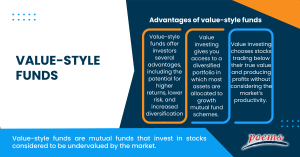Value-style funds
Table of Contents
Value-style funds
Value-style funds are mutual funds that invest in stocks considered to be undervalued by the market. These funds are often managed with a long-term investment horizon in mind, and they typically have a lower risk profile than growth or aggressive growth funds.
Value-style funds can be a good option for investors looking for a relatively conservative investment. They can also be a perfect choice for investors interested in stocks that are not necessarily in the spotlight but have the potential to generate strong returns over time.
What are value-style funds?
An equity fund that trades in undervalued equities is a value mutual fund. For instance, undervalued shares trade for less than what the company’s fundamentals indicate.
Almost all major fund families provide value funds. These funds are frequently divided into several parts. Market cap is one of the most often used categories for variation. Investors can select, for instance, from a fund family that offers small-cap, mid-cap, and large-cap value funds.
Understanding value-style funds
Value- style funds may also invest in companies with a strong balance sheet and low debt levels. These companies may be less exciting than others in the market, but they are seen as more stable and less likely to default on their debt obligations.
Using a value investing technique, an investor (or fund manager) searches for undervalued companies and trades at prices below their corresponding intrinsic values. There are numerous businesses on the market whose stock value does not accurately reflect their value. They are innately worth more and have enormous growth potential.
A company’s intrinsic worth is determined by its financial situation, management team, competitive position, business model, etc. The corporation is said to have “value” if its market value is higher than its intrinsic worth. Consequently, a value fund is an equities fund that buys stocks of businesses with “value”.
How value-style funds work?
One of the most ardent supporters of value investing could be billionaire investor Warren Buffett. Value managers focus their stock selecting decisions for value funds on the fundamental factors contributing to a stock’s intrinsic value.
Value-style funds are frequently employed as long-term investment allocations because they can increase consistently over time. As a result, investing in value-style funds is commonly linked to patience and careful research.
As these funds focus on underperforming stocks which are anticipated to do better in the long term, they may be of interest to investors with a long-term investment horizon. Value funds can also provide dividends, making them appealing to people searching for a reliable side hustle.
Advantages of value-style funds
- Value-style funds offer investors several advantages, including the potential for higher returns, lower risk, and increased diversification.
- Value investing gives you access to a diversified portfolio in which most assets are allocated to growth mutual fund schemes.
- Value investing chooses stocks trading below their true value and producing profits without considering the market’s productivity.

Example of value-style funds
- The ClearBridge Large Cap Value Fund (SAIFX)
The ClearBridge Large Cap Value Fund is an actively maintained value fund that pursues capital growth and income through a value-focused investing approach. Various share classes are available from the fund. A reliable quarterly dividend is also paid by it.
Frequently Asked Questions
Investors like value-style funds because they put money into businesses with a solid record of dividends, sales, earnings, etc. The share prices of these businesses are inexpensive despite their strong fundamentals. Value-style funds are, therefore, perfect for individuals wishing to diversify their holdings for long-term objectives.
Value-style fund investors need to have a long investing horizon. Also, to guarantee a steady return on investment throughout any market cycle, investors with significant exposure to growth equities choose value funds.
Investors looking to add value-style mutual funds to their portfolios should consider key factors before making any decisions. First, it is important to understand the distinction between value and growth investing.
Next, investors should consider their investment objectives and risk tolerance when deciding whether or not to add value-style mutual funds to their portfolios. Value investing can be a more volatile strategy, so investors looking for stability may want to consider other options. However, value-style mutual funds can be a good option for investors willing to take on more risk in pursuit of higher returns.
Finally, investors should research different value-style mutual funds before making decisions. There are many different ways to measure value, and each fund may use a different approach. Some funds focus on companies with low price-to-earnings ratios, while others focus on companies with high dividend yields. There is no right or wrong approach, but investors should ensure they understand how each fund calculates value before investing.
By taking the time to consider these factors, investors can make sure they are making the best decision for their portfolios.
A few benefits of value investing are:
- Value investing gives you access to a diverse portfolio where most assets are allocated to growth mutual fund schemes.
- Value-style funds are less susceptible since their investment approach concentrates on undervalued stocks.
- Value fund holdings are spread throughout all ignored economic sectors. The market credibility of the underperforming equities is increased as a result.
Value investing focuses on buying stocks undervalued by the market, while growth investing focuses on buying stocks with the potential for above-average growth. While both strategies can be successful, they tend to perform differently in different market conditions.
There are several strategies that value-style funds use in order to generate returns.
- One common strategy is to invest in companies that are undervalued by the market. These companies may be out of favor with investors, but the fund manager believes that they are still good businesses with solid fundamentals.
- Another strategy is to invest in companies with high dividend yields. These companies may be considered riskier investments, but the fund manager believes that the high dividends offset the risks.
Related Terms
- Sovereign Wealth Fund
- New fund offer
- Commingled funds
- Taft-Hartley funds
- Umbrella Funds
- Late-stage funding
- Short-term fund
- Regional Fund
- In-house Funds
- Redemption Price
- Index Fund
- Fund Domicile
- Net Fund Assets
- Forward Pricing
- Mutual Funds Distributor
- Sovereign Wealth Fund
- New fund offer
- Commingled funds
- Taft-Hartley funds
- Umbrella Funds
- Late-stage funding
- Short-term fund
- Regional Fund
- In-house Funds
- Redemption Price
- Index Fund
- Fund Domicile
- Net Fund Assets
- Forward Pricing
- Mutual Funds Distributor
- International fund
- Balanced Mutual Fund
- Value stock fund
- Liquid funds
- Focused Fund
- Dynamic bond funds
- Global fund
- Close-ended schemes
- Feeder funds
- Passive funds
- Gilt funds
- Balanced funds
- Tracker fund
- Actively managed fund
- Endowment Fund
- Target-date fund
- Lifecycle funds
- Hedge Funds
- Trust fund
- Recovering funds
- Sector funds
- Open-ended funds
- Arbitrage funds
- Term Fed funds
- Thematic funds
- Growth-style funds
- Equity fund
- Capital preservation fund
Most Popular Terms
Other Terms
- Physical ETF
- Initial Public Offering
- Buyback
- Secondary Sharing
- Bookrunner
- Notional amount
- Negative convexity
- Jumbo pools
- Inverse floater
- Forward Swap
- Underwriting risk
- Reinvestment risk
- Final Maturity Date
- Payment Date
- Secondary Market
- Margin Requirement
- Mark-to-market
- Pledged Asset
- Yield Pickup
- Subordinated Debt
- Trailing Stops
- Treasury Stock Method
- Stochastic Oscillator
- Bullet Bonds
- Basket Trade
- Contrarian Strategy
- Exchange Control
- Notional Value
- Relevant Cost
- Dow Theory
- Speculation
- Stub
- Trading Volume
- Going Long
- Pink sheet stocks
- Rand cost averaging
- Sustainable investment
- Stop-limit sell order
- Economic Bubble
- Ask Price
- Constant prepayment rate
- Covenants
- Stock symbol
- Companion tranche
- Synthetic replication
- Bourse
- Beneficiary
- Witching Hour
- Widow and Orphan stock
- Public Float
Know More about
Tools/Educational Resources
Markets Offered by POEMS
Read the Latest Market Journal

Back in Business: The Return of IPOs & Top Traded Counters in March 2024
Start trading on POEMS! Open a free account here! At a glance: Major indices continue...

Weekly Updates 15/4/24 – 19/4/24
This weekly update is designed to help you stay informed and relate economic and company...

From $50 to $100: Unveiling the Impact of Inflation
In recent years, inflation has become a hot topic, evoking strong emotions as the cost...

Japan’s Economic Resurgence: Unveiling the Tailwinds Behind Nikkei 225’s Record Leap
Source: eSignal, Intercontinental Exchange, Inc. In the heart of Japan’s economic landscape, the Nikkei 225...

Weekly Updates 8/4/24 – 12/4/24
This weekly update is designed to help you stay informed and relate economic and...

What Makes Forex Trading Attractive?
In a world where the click of a button can send goods across oceans and...

Weekly Updates 1/4/24 – 5/4/24
This weekly update is designed to help you stay informed and relate economic and company...

How to soar higher with Positive Carry!
As US Fed interest rates are predicted to rise 6 times this year, it’s best...












